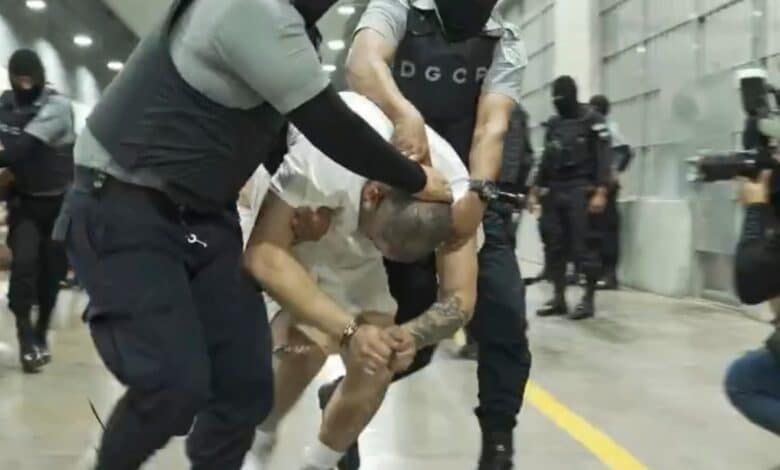The DOJ says that he will appeal to Abrego García’s decision, publishes documents that link him to a gang

The Department of Justice presented a notice on Wednesday that it will appeal the order of a federal judge that requires the Government to facilitate the return of Kilmar Abrego García de El Salvador, the same day that he published two documents that allegedly supposedly link him to the MS-13 criminal gang.
The two form the government present as evidence: a sheet of gang field interviews of the Prince George County Police Department in Maryland and an additional form of the National Security Department, the alleged affiliation of gangs of the Base of Abrego García about his clothes and information from a confidential informant described as a “source of past and reliable information.”
Reports do not provide other information beyond clothing and the confidential informant to justify the statement that Abrego García is a member of the classification gang.
Abrego García is entering his second month in a Mega Prisbin in El Salvador after he was deported there on March 15 despite receiving a 2019 court order that prohibits deportation to his country of origin due to fear of persecution.
His lawyers and his wife have denied that he is a member of MS-13, and his lawyers have questioned the validity of the document by claiming the detective who was suspended later.
On Tuesday Secretary of Public Affairs of the DHS, Tricia McLaughlin, told Jay O’Brien de ABC News that the deportation of Abrego García to El Salvador was the result of a “clerical error” and that “it should have been sent to a detention center in Mexico, Nicaragua, Egypt.”
According to the gang field interviews, a report from the police interaction with Abrego García, the police approached him in 2019 after they said he was groking in an Home Depot parking lot in Hyattsville, Maryland.

Photo without a date provided by the United States District Court for the Maryland district, a man identified by Jennifer Vásquez Sura when her husband, Kilmar Abrego García, is directed by force by the guards through the Center for Confinement of Terrorism in Tecolluca, El Salvador.
United States District Court for the Maryland district through AP
The report indicated that Abrego García wore a Chicago Bulls hat and a hooded sweatshirt with images of rolls of money that cover the eyes and ears of former US presidents, which the police said that he tied Abrego García to the gang.
“The officers know that these clothes are indicative of the culture of Hispanic gangs,” said the report, pointing out that the meaning of clothing is “not seeing bad, does not hear evil and not saying evil.”
“Using the Chicago Bulls hat represents that they are members in good position with the MS-13,” the report said.
According to the report, the officers contacted a “source of proven and reliable information” that said Abrego García was a MS-13 classification member. Abrego García had the “check” range and had the nickname “Chele”, according to the informant. According to the Department of Justice, a check is a low level member of MS-13.
The DHS report added that Abrego García was in possession of $ 1,178 at the time of his arrest.
The report pointed out that Abrego García was in the company of three other men when he was arrested, one of whom, according to the police, had an extensive criminal history and was known as an active member of a gang. Another was linked to MS-13 based on a confidential source, according to the report.

Kilmar Abrego García, a Salvadoran migrant in this booklet image obtained by Reuters on April 9, 2025.
Abrego Garcia Family Via Reuters
Police said they could not link the third man with the gang, writing that “the members of the MS-13 gang are only allowed to pass through the other members or the perspectives of the gang.”
The other document, a DHS I-21 Form, cited the interview sheet of the Prince George County Police Department to affirm that Abrego García was “identified” and “validated” as a member of MS-13. Abrego García denied having had information about the gang or human smuggling, according to the DHS report.
An immigration judge that denied the bail of Abrego García in 2019 cited both reports such as the main evidence to conclude that it represented a risk to the community.
Abrego García’s lawyers have highlighted apparent inconsistencies in the DHS report, saying that it offers contradictory evaluations about whether Abrego García feared to be transferred to El Salvador.
His lawyers have also stressed that confidential information linked Abrego García with the western clique of MS-13, which operates mainly in Long Island, where they say he has never lived.
The report also noted that the other two alleged gang members in the Home Depot parking lot were members of a different MS-13 clique.
Wednesday’s developments occurred one day after the United States District Judge, Paula Xinis, ordered government officials to testify under oath because, he said, “they had not done anything to help in the release of Abrego García de la Custody and the return to the United States”, despite the Supreme Court that ordered the Trump administration to “provide” the release of Abrego Garcia in Custodia. El Salvador “.
According to the orders of Judge Xinis, the Trump administration presented on Wednesday its daily update on Abrego García, saying that “they were no more updates.”
“Given the previous and unequivocal notice of the Government to the court on how the Government will facilitate the return of Abrego García within the contours of the existing law and regulation, there are no more updates,” said Joseph Mazzarra, the interim general advisor of the Department of National Security, in the update.





